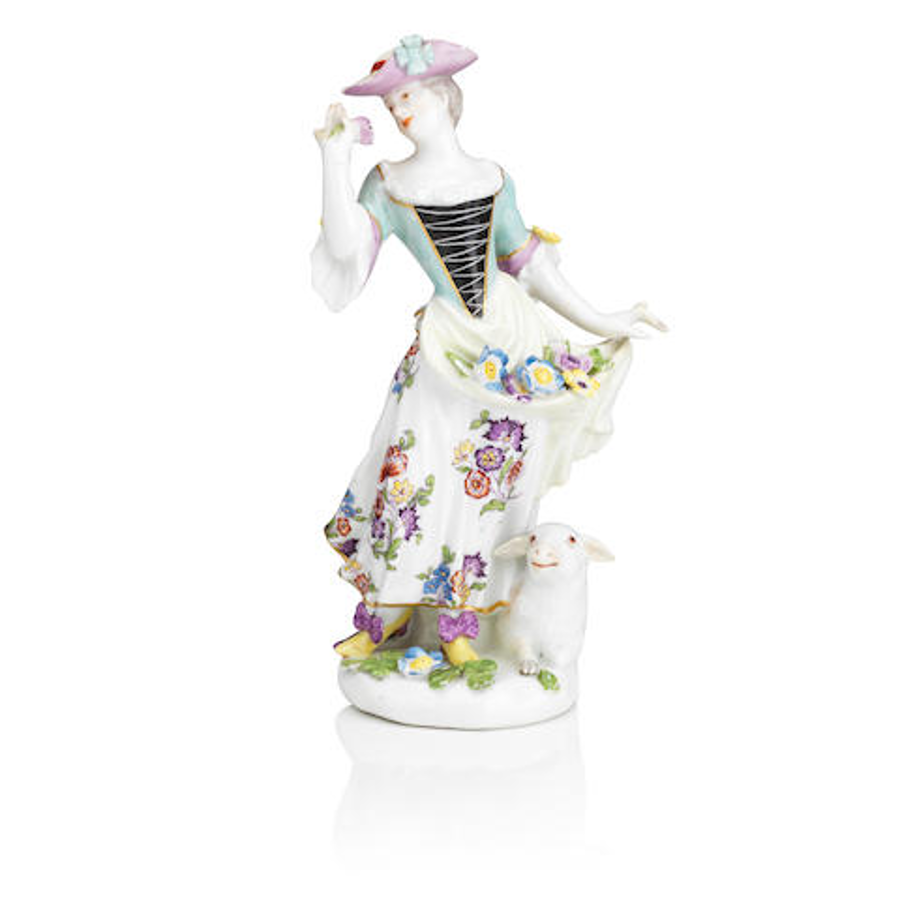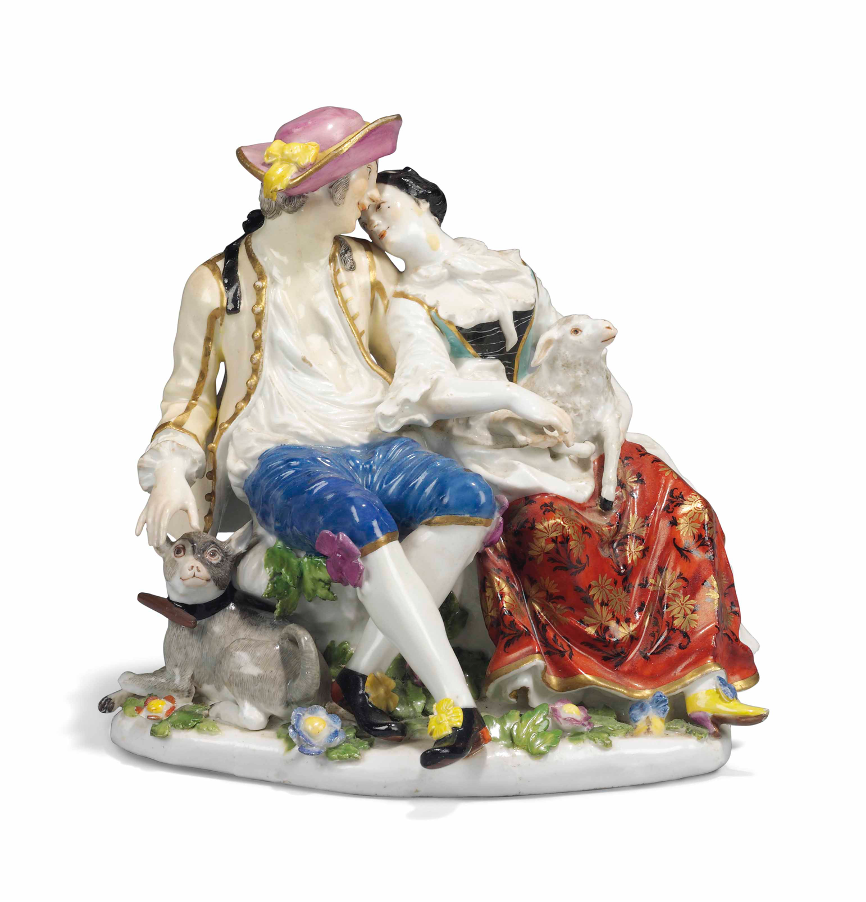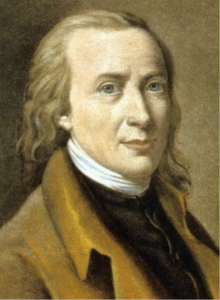Phidile
(Poet's title: Phidile)
Set by Schubert:
D 500
[November 1816]
Ich war erst sechzehn Sommer alt,
Unschuldig und nichts weiter,
Und kannte nichts als unsern Wald,
Als Blumen, Gras und Kräuter.
Da kam ein fremder Jüngling her;
Ich hatt’ ihn nicht verschrieben,
Und wusste nicht wohin, woher;
Der kam und sprach von Lieben.
Er hatte schönes, langes Haar
Um seinen Nacken wehen,
Und einen Nacken, als das war,
Hab ich noch nie gesehen.
Sein Auge, himmelblau und klar,
Schien freundlich was zu flehen,
So blau und freundlich, als das war,
Hab ich noch keins gesehen.
Und sein Gesicht war Milch und Blut,
Ich hab’s nie so gesehen,
Auch, was er sagte, war sehr gut,
Nur konnt ich’s nicht verstehen.
Er ging mir allenthalben nach
Und drückte mir die Hände,
Und sagte immer O und Ach!
Und küsste sie behende.
Ich sah ihn einmal freundlich an
Und fragte, was er meinte,
Da fiel der junge, schöne Mann
Mir um den Hals und weinte.
Das hatte Niemand noch getan,
Doch war’s mir nicht zuwider,
Und meine beiden Augen sahn
In meinen Busen nieder.
Ich sagt’ ihm nicht ein einzigs Wort,
Als ob ich’s übel nähme,
Kein einzigs, und, er flohe fort,
Wenn er doch wieder käme!
I was just sixteen summers old,
Nothing but innocent,
And I knew nothing except our wood,
Nothing but our flowers, trees and herbs.
Then along came a young man, a stranger;
I had not summoned him,
And I did not know where he might be from;
Along he came and spoke of love.
He had beautiful long hair
Flowing around his neck;
And a neck like that
Is something I have never seen before.
His eyes, sky blue and clear!
They appeared to be asking for something in a friendly way,
Such blue and friendly eyes as that,
I have never seen any like that.
And his face, it was milk and blood!
I have never seen anything like it;
Also, what he said was very good,
Except I could not understand it.
He followed me everywhere,
And he pressed my hands,
And kept saying ‘oh’ and ‘ah’,
And quickly kissed them.
I gave him a single friendly glance
And asked what his intentions were;
Then the beautiful young man fell
Around my neck and started crying.
Nobody had ever done that before;
But I did not object to it,
And both my eyes looked
Down into my bosom.
I did not say a single word to him
That might have given him the idea I had taken it badly,
Not a single word, and he fled away;
If only he would come back!
All translations into English that appear on this website, unless otherwise stated, are by Malcolm Wren. You are free to use them on condition that you acknowledge Malcolm Wren as the translator and schubertsong.uk as the source. Unless otherwise stated, the comments and essays that appear after the texts and translations are by Malcolm Wren and are © Copyright.
☙
Themes and images in this text:
Blue Chest / breast Eyes Flowers Grass Hair Hands Tears and crying Woods – large woods and forests (Wald)
We know from her name (Phidile) that she is not intended to be an ordinary 16 year old girl from the poet’s own stamping grounds of Holstein or the region around Hamburg; her home is Arcadia. Even for Horace, whose Ode (3, 23) immortalised her, she was already a character from ancient times or mythology. She is the quintessential shepherdess who was well known in 18th century Germany as a Meissen figurine. Claudius allows us into her thoughts about the first time when one of the swains attempted (clumsily) to declare his passion for her. She is presented as behaving properly, not leading him on, doing what all well-brought up young ladies should do in the circumstances (in this she is probably more 18th century Germanic than pre-classical Hellenic).
It is this very coyness which is so sexy for the heterosexual male writer and readers, though. She does not actually say ‘no’, so she must mean ‘yes’. She is just the sort of virgin that needed to be shown the ropes. She admits that she was so innocent that all she knew about was woods, flowers, grass and herbs. Not an animal in sight. Where were the birds and the bees in her upbringing? How can a shepherdess not know about lambing and tupping? The more she protests her innocence of these matters the more interested she seems. Even her bashful downturned eyes when the lad declares himself draw attention to her sixteen-year old breasts.
☙
Caelo supinas si tuleris manus
nascente luna, rustica Phidyle,
si ture placaris et horna
fruge Laris avidaque porca:
nec pestilentem sentiet Africum
fecunda vitis nec sterilem seges
robiginem aut dulces alumni
pomifero grave tempus anno.
nam quae nivali pascitur Algido
devota quercus inter et ilices
aut crescit Albanis in herbis
victima, pontificum securis
cervice tinguet: te nihil attinet
temptare multa caede bidentium
parvos coronantem marino
rore deos fragilique myrto.
inmunis aram si tetigit manus,
non sumptuosa blandior hostia,
mollivit aversos Penatis
farre pio et saliente mica.
Q. Horatius Flaccus, Carmina 3, 23
Phydile, my country girl, if you raise your
upturned palms to heaven, at the new-born moon,
if you placate the Lares with corn
from this year’s harvest, with a greedy pig:
your fruiting vines won’t suffer the destructive
southerlies, nor your crops the killing mildew,
nor will the young of the flock be born
in that sickly season, heavy with fruit.
Since the destined victim, grazing, on snowy
Algidus, amongst the oak and ilex trees,
or fattening in the Alban meadows,
will stain the axes of the priest with blood:
there’s no need for you to try and influence
the gods, with repeated sacrifice of sheep
while you crown their tiny images
with rosemary, and the brittle myrtle.
If pure hands have touched the altar, even though
they’ve not gratified with lavish sacrifice,
they’ll mollify hostile Penates,
with the sacred corn, and the dancing grain.
English translation by A.S. Kline © 2003
http://www.poetryintranslation.com/PITBR/Latin/HoraceOdesBkIII.php#anchor_Toc40263868


18th century
https://www.bonhams.com/auctions/26036/lot/26/


CIRCA 1745
https://www.christies.com/lotfinder/Lot/a-meissen-group-of-a-shepherd-and-5989431-details.aspx
Original Spelling and notes on the text Phidile Ich war erst sechszehn Sommer alt, Unschuldig und nichts weiter, Und kannte nichts als unsern Wald, Als Blumen, Gras und Kräuter. Da kam ein fremder Jüngling her; Ich hatt' ihn nicht verschrieben, Und wußte nicht wohin, woher1; Der kam und sprach von Lieben. Er hatte schönes langes Haar Um seinen Nacken wehen; Und einen Nacken, als das war, Hab ich noch nie gesehen. Sein Auge, himmelblau und klar! Schien freundlich was zu flehen, So blau und freundlich, als das war, Hab ich noch kein's gesehen. Und sein Gesicht war2 Milch und Blut! Ich hab's nie so gesehen; Auch, was er sagte, war sehr gut, Nur konnt' ich's nicht verstehen. Er gieng mir allenthalben nach, Und drückte mir die Hände, Und sagte immer O und Ach, Und küßte sie behende. Ich sah' ihn einmahl freundlich an, Und fragte, was er meynte; Da fiel der junge schöne Mann Mir um den Hals, und weinte. Das hatte Niemand noch gethan; Doch war's mir nicht zuwieder, Und meine beyden Augen sahn In meinen Busen nieder. Ich sagt' ihm nicht ein einzig Wort, Als ob ichs übel nähme, Kein einzigs, und - er flohe fort; Wenn er doch wieder käme! 1 Schubert changed 'wo hin noch her' to 'wohin, woher' (no essential change in meaning) 2 Schubert changed 'wie' (like) to 'war' (it was)
Confirmed by Peter Rastl with Schubert’s probable source, ASMUS omnia sua SECUM portans, oder Sämmtliche Werke des Wandsbecker Bothen, I. und II. Theil. Beym Verfasser, und in Commißion bey Fr. Perthes in Hamburg. [1774], pages 54-56; with ASMUS omnia sua SECUM portans, oder Sämmtliche Werke des Wandsbecker Bothen, Erster und zweiter Theil. Wandsbeck, 1774. Beym Verfasser, pages 34-35.
First published 1771 in a slightly different form in Göttinger Musenalmanach
To see an early edition of the text, go to page 54 here: https://resolver.sub.uni-hamburg.de/kitodo/PPN840695020


